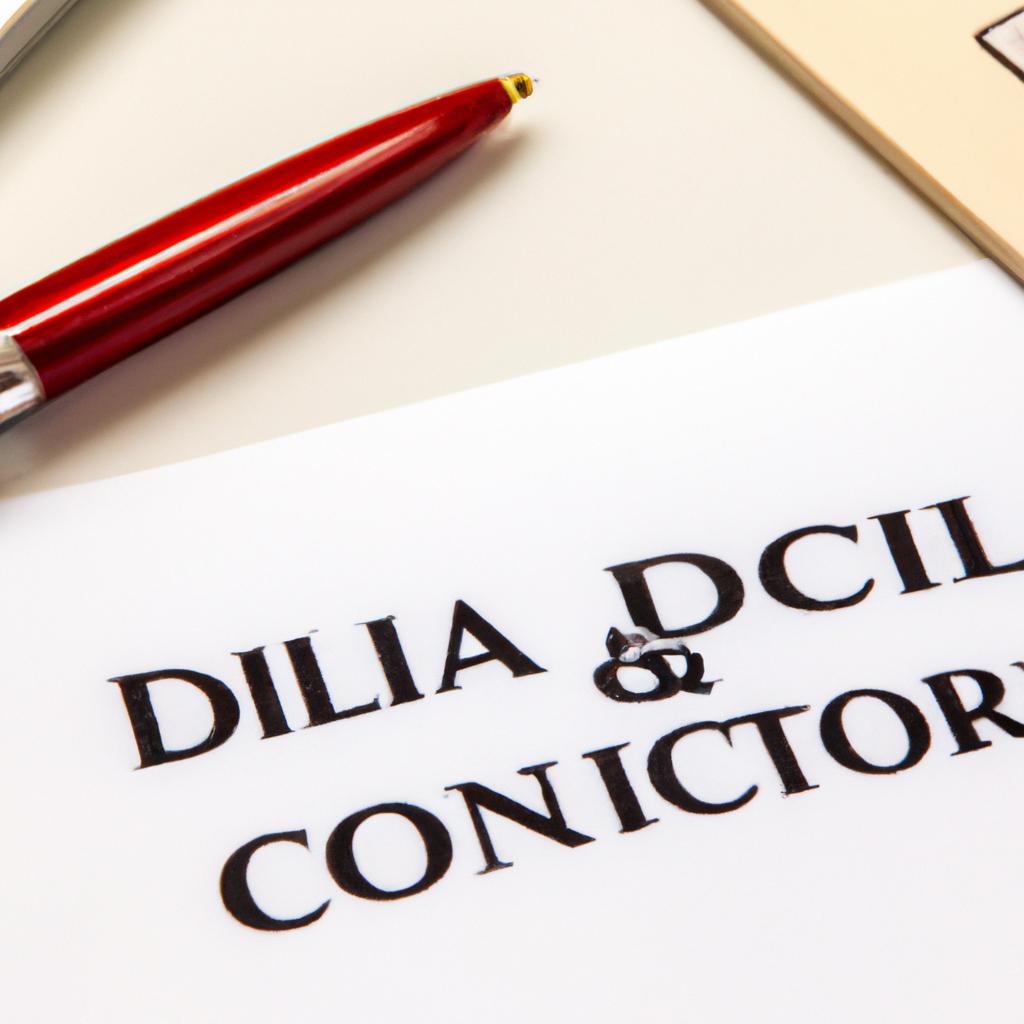Navigating the complexities of estate planning can often feel like walking through a legal labyrinth. Many individuals may wonder, “When should I begin this process?” At Morgan Legal Group in New York City, we understand the importance of this question. Estate planning is not just for the elderly or the wealthy; it is a crucial step that everyone should take to safeguard their assets and ensure the seamless transfer of wealth to their loved ones. In this article, we will explore the factors to consider when deciding when to establish an estate plan and why it is never too early to start this essential process.
Determining the Appropriate Timing for Creating an Estate Plan
Creating an estate plan is an essential step towards securing your assets and ensuring your loved ones are taken care of in the future. However, determining the appropriate timing for establishing an estate plan can vary depending on individual circumstances. Here are some factors to consider when deciding when to create an estate plan:
- Life events: Major life events such as marriage, the birth of a child, divorce, or the death of a loved one should prompt a review of your estate plan to ensure it still aligns with your wishes.
- Age: While it’s never too early to start planning, as you age and accumulate more assets, it becomes increasingly important to have a comprehensive estate plan in place.
- Health: If you have a serious illness or health condition, creating an estate plan becomes urgent to outline your medical wishes and ensure your assets are distributed according to your preferences.
| Age Range | Recommended Estate Planning Action |
|---|---|
| 18-30 | Establishing a basic Will and healthcare directive. |
| 30-50 | Updating Will and considering trusts for minor children. |
| Above 50 | Implementing a comprehensive estate plan including trusts and long-term care planning. |
Ultimately, the best time to create an estate plan is now. By working with an experienced estate planning attorney, like Morgan Legal Group in New York City, you can ensure that your wishes are legally documented and your assets are protected for future generations.

Key Considerations for Initiating Estate Planning Measures
Review your current assets and liabilities: Before initiating any estate planning measures, it is crucial to take stock of your current financial situation. This includes assessing your assets such as real estate, investments, retirement accounts, and personal belongings, as well as your liabilities such as debts and mortgages.
Consider your family dynamics: When deciding when to get an estate plan, it is important to consider your family dynamics and relationships. This includes thinking about who you want to inherit your assets, who you want to appoint as guardians for minor children, and who you trust to make healthcare or financial decisions on your behalf in case you become incapacitated.

Why It’s Crucial to Establish an Estate Plan Sooner Rather Than Later
One of the most important decisions you can make in your life is to establish an estate plan. It’s crucial to do this sooner rather than later, as none of us know what the future holds. By creating an estate plan early on, you can ensure that your assets are distributed according to your wishes and that your loved ones are taken care of in the event of your passing.
There are several key reasons why establishing an estate plan early on is essential:
- Protect your assets: By creating a will or trust, you can protect your assets and ensure that they are distributed according to your wishes.
- Provide for your loved ones: An estate plan allows you to provide for your loved ones, including children, spouses, and other family members.
- Avoid probate: Proper estate planning can help your loved ones avoid the costly and time-consuming probate process.

Expert Recommendations for Beginning the Estate Planning Process
As experienced estate planning attorneys, we often get asked, “When should you get an estate plan?” It’s a common question with a simple answer: the sooner, the better. Whether you’re a young professional just starting out or a retiree enjoying your golden years, it’s never too early or too late to begin the estate planning process.
Our include:
- Consulting with a knowledgeable estate planning attorney to discuss your goals and options
- Creating a comprehensive list of your assets, debts, and beneficiaries
- Drafting essential estate planning documents such as Wills, trusts, and powers of attorney
- Regularly reviewing and updating your estate plan as needed
Q&A
Q: When should you start thinking about creating an estate plan?
A: It’s never too early to start thinking about creating an estate plan. In fact, the sooner you start planning, the better prepared you will be for the unexpected.
Q: What life events should prompt someone to create an estate plan?
A: Life events such as getting married, having children, buying a home, or starting a business are all good reasons to create an estate plan. Additionally, any major changes in your financial situation or health should prompt a review of your estate plan.
Q: What are the benefits of having an estate plan in place?
A: Having an estate plan in place can help ensure that your assets are distributed according to your wishes, reduce the burden on your loved ones during a difficult time, minimize estate taxes, and provide for your beneficiaries in the way you see fit.
Q: What happens if you don’t have an estate plan?
A: If you die without an estate plan in place, your assets will be distributed according to state law, which may not align with your wishes. This can lead to family disputes, higher estate taxes, and a lengthy probate process.
Q: How often should you review and update your estate plan?
A: It’s important to review and update your estate plan regularly, especially after major life events such as marriage, divorce, the birth of a child, or a change in financial situation. We recommend reviewing your estate plan at least every three to five years.
To Wrap It Up
As you contemplate the question of when to create an estate plan, remember that preparation is key in securing the future for yourself and your loved ones. Whether you’re starting a family, planning for retirement, or simply wanting to protect your assets, the time to take action is now. Consult with a qualified estate planning attorney to tailor a plan that reflects your unique needs and goals. By investing in an estate plan today, you can rest assured that your legacy will be well-protected for generations to come.
 Be sure to cite any sources used.
Be sure to cite any sources used.
meta title: When Is the Right Time to Create an Estate Plan? An Overview of Benefits and Practical Tips
meta description: Unsure when you should get an estate plan? Learn about the benefits and practical tips associated with estate planning and determine if it’s the right time for you.
Creating an estate plan is something that many people often put off until they are much older, assuming they even need one at all. However, the reality is that estate planning is a crucial aspect of financial planning that should be considered at any stage of life. In fact, the earlier you start, the more options and protection you have for your assets and loved ones in the future. In this comprehensive and SEO-optimized article, we will discuss when you should get an estate plan, its benefits, and practical tips to help you make the best decision for your specific situation.
Understanding Estate Planning
Before diving into when you should get an estate plan, it’s essential to have a basic understanding of what it is. Simply put, an estate plan is a legal document that outlines how your assets will be distributed after your death and who will make decisions on your behalf if you become incapacitated. While this may seem like a morbid topic, it’s essential to consider, especially if you have loved ones who depend on you.
When Should You Get an Estate Plan?
There is no one-size-fits-all answer to this question, as everyone’s situation is unique. However, some general guidelines can help determine when the right time is for you to consider creating an estate plan. It’s crucial to keep in mind that estate planning should be an ongoing process and revisited as your life circumstances change.
1. When you have dependents or loved ones who rely on you
If you have young children or loved ones with special needs who depend on you for financial support, it’s crucial to have an estate plan in place. In the event of your untimely passing, an estate plan can ensure that your assets are designated for their care and well-being.
2. When you have substantial assets
Regardless of your age, suppose you have assets such as a home, investments, or insurance policies. In that case, it’s essential to have an estate plan in place to safeguard them and ensure they are distributed according to your wishes. Otherwise, your state’s laws will dictate how your assets are distributed, which may not align with your preferences.
3. When you want to avoid probate
Having an estate plan can help your loved ones avoid the time-consuming and expensive probate process. Probate is the court-supervised process of distributing assets and paying off debts after someone’s passing. Without a proper estate plan, your assets will go through probate, which can take months or even years to complete.
Benefits of Estate Planning
Now that we’ve discussed when you should consider getting an estate plan let’s explore some of the benefits it offers.
1. Protects your assets
An estate plan gives you control over how your assets will be distributed, protecting them from being distributed in ways you wouldn’t want. It also helps minimize estate taxes, which can significantly impact the value of your estate.
2. Provides for your loved ones
An estate plan lets you designate guardians for your minor children, ensuring they are taken care of by someone you trust. It also enables you to provide for loved ones with special needs and ensure their care and financial support after you are gone.
3. Avoids family conflicts
Having a clear and legal estate plan can help prevent conflicts among family members over the distribution of your assets. This can be especially crucial in blended families or situations where family dynamics are complicated.
4. Allows you to make healthcare and financial decisions
Your estate plan can include documents such as a living will and a durable power of attorney. These legal documents will allow you to designate someone to make healthcare and financial decisions on your behalf if you are unable to do so yourself, giving you peace of mind.
Practical Tips for Estate Planning
Now that you understand the importance and benefits of estate planning let’s go over some practical tips to help you get started.
1. Determine your goals
Before creating an estate plan, take some time to think about your goals, values, and priorities. This will help guide your decisions when it comes to designating beneficiaries, choosing a guardian for your children, and making healthcare and financial decisions.
2. Seek professional advice
Creating an estate plan can be a complex and overwhelming process, so it’s crucial to seek professional advice from an estate planning attorney. They can help ensure all your legal documents are in order and accurately reflect your wishes and answer any questions you may have.
3. Review and update regularly
It’s essential to review and update your estate plan regularly, especially when significant life events occur, such as marriage, divorce, or the birth of a child. Failing to update your estate plan can result in its invalidation, so it’s crucial always to keep it up to date.
Final Thoughts
Ultimately, it’s never too early to start thinking about estate planning. By doing so, you are taking control of your assets and ensuring your loved ones are taken care of in the future. If you have any questions or concerns about estate planning, don’t hesitate to seek professional advice. Remember, an estate plan is an ongoing process, so don’t forget to review and update it as needed. By following the practical tips mentioned in this article, you can create an estate plan that reflects your goals and priorities and provides for your loved ones for years to come.

